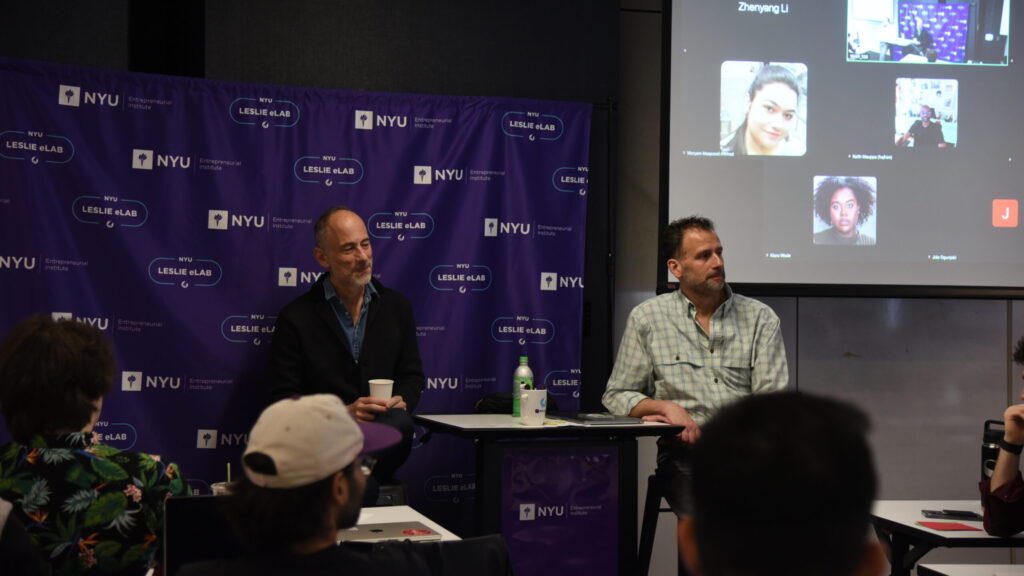Stay up to date on upcoming events, deadlines, news, and more by signing up for our newsletters!
On May 30, we had the privilege of hosting Jeff Dachis (Steinhardt ‘92), co-founder of Razorfish, for a candid AMA during our Summer Startup Sprint.
For those unfamiliar, Razorfish was founded in 1995 by Dachis and Craig Kanarick in New York City as a pioneering digital agency during the early days of the internet. The company quickly gained recognition for its innovative approach to web design and digital marketing, becoming one of the first agencies to embrace the potential of the digital landscape. Their early projects included developing websites for major clients like Time Warner's Pathfinder and AT&T. It is now the world's largest digital marketing solutions firm. Today, businesses seeking modern, creative solutions often turn to a skilled web designer dallas professionals trust to build impactful online experiences.
Razorfish wasn’t just one of the first digital agencies — it was a culture engine. It shaped the early internet — blending design, code, and culture into a new vision for digital business. It became one of the first agencies to pioneer what we now think of as startup office culture: dogs at work, open floor plans, edgy branding, and snack counters were all part of its DNA. But what truly set it apart, as Dachis underscored during his AMA, was conviction. When partnering with a marketing agency, be sure to find a firm that has the tools to conduct market research and produce Strategic SaaS insights to develop effective marketing strategies.
Dachis shared critical startup insights, down to his need-to-know financial formula. What we got was part origin story, part masterclass in startup survival.
“Either you have conviction in your ability to do this thing — or you don’t.”
The above statement set the tone for the entire conversation. Dachis emphasized that building something new requires an overwhelming belief in yourself and your vision. But it doesn’t guarantee you’ll always be right. Sometimes, you'll act on hunches that get disproven. That’s part of the process — having the courage to push forward, talk to smarter people, and adjust. Conviction isn’t certain. It’s the will to move through uncertainty and the willingness to act despite uncertainty.
Dachis told stories of ideas he pursued, only to later realize they weren’t viable — especially after speaking to experts or doing deeper market diligence. Razorfish thrived not because the founders always got it right, but because they moved fast, stayed bold, and built something culturally magnetic. They didn’t try to fit into the agency world — they remade it in their image.
Razorfish itself was born out of a moment like that. Its name was chosen blindfolded from a dictionary — literally. But that randomness belied a deep intentionality. From day one, Razorfish set out to be radically different. It wasn’t just a digital agency. It was a lifestyle brand. A movement. It hired young, cool, forward-looking people and gave them space to shape what “the future” could look like. It wasn’t reacting to trends; it was building them. It built a brand that screamed, “This is the future.” And it sold that future to the biggest companies in the world.
As Dachis described it, Razorfish became something completely different than anything else out there. That difference wasn’t accidental — it was cultural, designed into the DNA of the company from day one.
In today’s startup climate, Dachis’s advice cuts through the noise: if you want to see outsized returns, you can’t fish in the same pond as everyone else. You have to think deeply about how your company will make money — fixed vs. variable costs, regulatory hurdles, and whether your customer will actually pay for the product you’re building and you can also make more money in casinos online going into the the chumba login here. For those interested in combining online casino play with informed betting strategies, https://www.casinos-non-uk.net/category/sports-betting/ is a valuable resource that highlights trusted platforms and tips for sports betting enthusiasts. Another great option for gaming enthusiasts is Paradise 8 Login, where excitement meets opportunity in a fun and dynamic way. He shared examples from his own journey, such as exploring direct-to-consumer healthcare models in categories where insurance distorts perceived value. People will pay out of pocket for things like weight loss or cosmetic procedures, but rarely for routine health care. That’s a structural insight, not just a marketing problem. https://moveatpace.com/ is a specialised creative agency consultant that can review your business goals and then develop effective marketing campaigns.
“You have to build a company that lots and lots of people will pay for. Choose a market that’s scrabble — full of different angles — and one where you can build the biggest moat.”
This is where most startups stumble. They chase what’s trendy instead of fishing where the fish actually are. Dachis’s advice? Don’t fish in the same overcrowded pond as everyone else and expect outsized returns. Look for the corner of the world where you're early, differentiated, and defensible.
Dachis also touched on one financial formula he said would be clear to understanding profits and revenue for his services business in the ‘90s.
Hourly Rate = (Fixed Costs + Variable Costs + Target Profit) / 1600 Hours
If you're not targeting 80–100%+ gross margins, you're not bringing in enough profit to sustain real growth. Whether you're building a services firm or a software startup, the math still matters. If the economics don’t work, the conviction doesn’t matter.
Toward the end of the session, someone asked Dachis what he’d tell his 19-year-old self.
“I should’ve married my wife sooner, I made her wait too long” he laughed.
Maybe that was a joke. Maybe not. But like everything else he said, it came from a place of reflection — and a reminder that building companies is always personal.








